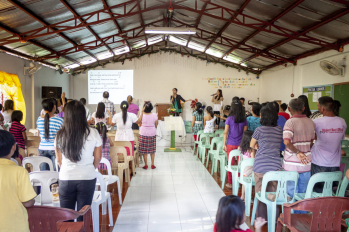
Twenty-five years have already gone by in this century, with immense changes—for better or for worse. This is a good moment to reflect on our changing world. Jesus talked of wheat and tares growing up together. Here’s a random sample of both.
The new millennium
Twenty-five years ago, the world was in the grip of Y2K panic. As January 1, 2000, drew near, fear spread around the world that a global computer bug would cause widespread computer failures in hospitals, airborne planes, traffic systems, television broadcasts, military control over rocket launches, including nuclear weapons? All eyes were on New Zealand, the first economically developed nation to see the new day, as the clock clicked towards midnight on New Year’s Eve ahead of the rest of the world. 23.58… 23.59…00.00…00.01…phew! Nothing untoward happened.
Technological advances
Our world has become overwhelmingly shaped by computers in almost every field.
Twenty-five years later, our world has become overwhelmingly shaped by computers in almost every field. The iPhone introduced Smartphones only in 2007, one of the most transformative technological innovations of the 21st century. They now dictate our daily lifestyles: waking us up, feeding us Whatsapps, emails and social media updates, offering finger-tip access to daily Bible and meditation readings, weather reports, daily agendas, news headlines, directions for public transport for our appointments—and that’s all before getting out of bed!
Artificial intelligence
Twenty-five years of AI development has seen humans being overtaken in many fields: language and image recognition, artwork and articles on demand, driverless taxis, information on almost any subject, and more. A healthcare revolution is underway with technologies allowing medical practice from anywhere, any time, and from any device. Computers enable the production of artificial organs, 3-D printed body parts, heart and cancer treatments, robotic surgical procedures, and so it goes on.
Economics
The liberal vision of a society of autonomous individuals bound together by mutual self-interest has ceased to be a community of common values.
Twenty-five years ago the world euphorically celebrated the new millennium having reached the end goal of history with the triumph of liberal capitalism and the death of fascism and communism. But soon the world was rocked by several financial crises due to the deregularisation of markets, firstly in the US, then Europe and the rest of the world. Today experts talk of liberalism’s broken promises. The liberal vision of a society of autonomous individuals bound together by mutual self-interest has ceased to be a community of common values. Paradoxically, a liberal atomized society requires a stronger state to guarantee individual rights.
European Union
Twenty-five years ago the European Union had 15 member nations. Euro notes and coins were introduced in 12 EU nations in 2002. In 2004, ten new members joined followed two years later by Romania and Bulgaria. The EU received the Nobel Peace Prize in 2012 and Croatia peaked membership to 28 in 2013, before Britain decided to leave in 2016. Eight more post-communist states are currently in line for membership.
Marriage
Twenty-five years ago the first law providing for marriage equality between same-sex and opposite-sex couples was passed in the continental Netherlands. The flamboyant gay columnist-turned-politician, Pim Fortuyn, assassinated in 2002, called the new homo-wedding legislation ridiculous and superfluous, that marriage was an institution reserved worldwide for a bond between a man and a woman, and was surprised at how easily heterosexuals have allowed this institution to be applied to same-sex relationships. Today worldwide, marriage between same-sex couples is legally performed and recognized in 37 countries.
Russia
Twenty-five years ago Boris Yeltsin chose a relatively unknown former KGB officer named Vladimir Putin to take over his presidency of Russia as the new millennium was ushered in. Putin tightened his grip on power by amending Russia’s constitution to win a third and then a fourth term as president. Russia has become more autocratic and more belligerent under Putin, annexing the Crimean Peninsula in 2014 and launching an all-out invasion of Ukraine in 2022. The International Criminal Court has declared Putin guilty of crimes against humanity and genocide.
World Christianity
Twenty-five years has seen enormous growth of the majority world (non-Western) church.
Twenty-five years has seen enormous growth of the majority world (non-Western) church, in Africa, Asia, and Latin America. In 2005 Mark Noll estimated that more Anglicans gather for worship each Sunday in each of Kenya, South Africa, Tanzania, and Uganda than the Anglicans gathering in Britain and Canada, and Episcopalians in the United States combined. More Presbyterians gather for worship each Sunday in Ghana than in Scotland. Pentecostals will soon outnumber Catholics in Latin America. Each week fifteen thousand missionaries, mostly from Africa and Asia, are evangelizing communities in Great Britain.
Evangelism
Twenty-five years has seen Alpha courses spread around the world in over 100 countries and 112 languages with more than 24 million people having taken the course. Courses have been run by Anglican, Presbyterian, Lutheran, Baptist, Methodist, Pentecostal, Easterern Orthodox and Roman Catholic Churches. The Fresh Expressions movement, aiming to provide contextually relevant fellowships in a post-Christian society, has spawned thousands of new faith communities and has taken root in many countries.
Twenty-five years has brought many changes in our world. As we enter 2025 take time to consider what has been the wheat and tares in your world this past quarter century.
Originally published by Weekly Word. Republished with permission.
Jeff Fountain and his wife Romkje are the initiators of the Schuman Centre for European Studies. They moved to Amsterdam in December 2017 after living in the Dutch countryside for over 40 years engaged with the YWAM Heidebeek training centre. Romkje was founder of YWAM The Netherlands and chaired the national board until 2013. Jeff was YWAM Europe director for 20 years, until 2009. Jeff chaired the annual Hope for Europe Round Table until 2015, while Romkje chaired the Women in Leadership network until recently. Jeff is author of Living as People of Hope, Deeply Rooted and other titles, and also writes weekly word, a weekly column on issues relating to Europe.





